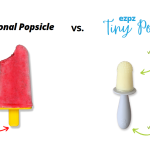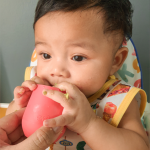Does Your Baby Pocket Food in Their Mouth?

Do you have a baby that holds food in their mouth and refuses (or is unable) to swallow it? In my baby-led weaning (BLW) courses, I educate parents on how pocketing can lead to gagging and choking incidents. In this blog, I’m sharing strategies to help your baby avoid and overcome pocketing.
What is “Food Pocketing?”
Food pocketing occurs when a baby holds leftover food in their mouth without swallowing it. Sometimes the food is chewed, but often there can be whole pieces of food. Pocketing can be a choking risk, especially if the food becomes dislodged during play or while sleeping.
Where Does Food Pocketing Occur?
There are “pockets” in the mouth where food can hide. Check your baby for pocketing in the following mouth areas:
- Cheeks (check both sides)
- Gums (inspect the front and back of their gum line)
- Tongue (look under the tongue)
- Palate (asses the roof of your baby’s mouth)
- Lips (check both the bottom and upper lip)
Why Does Food Pocketing Occur?
Babies can pocket food for several reasons, but these are the four most common causes I see in my private practice:
1. Sensory Awareness
Most babies I work with are unaware that there is still food in their mouths, which is why pocketing can be so dangerous. When you can’t feel the food, pocketing can occur.
2. Motor Awareness
Often I see babies who do not have the motor skills to push out the food or produce a strong swallow with good tongue elevation. When you can’t move the food, pocketing can occur.
3. Taste Awareness
Some babies are offered the same bland or tasteless foods over and over. The problem here is when they can’t taste the food, pocketing can occur.
4. Pain Awareness
In my clinical experience, babies who have either gastroesophageal reflux disease (GERD) or dysphagia refuse to swallow food because they may associate it with pain or discomfort. Other babies may be recovering from a tongue- or lip-tie surgery. During their oral recovery, they may be interested in tasting foods but not necessarily chewing and swallowing them. When you can’t tolerate pain, pocketing can occur.
What Strategies Can I Use to Decrease Food Pocketing?
Your baby is learning how to eat, and the more your baby practices eating a variety of tastes, textures, and temperatures, the better their swallowing skills will be. I prefer to teach how to decrease pocketing at mealtime and reduce gagging & choking risks. So, here are the three strategies I use most when working with babies that don’t swallow all their food:
Bites + Sips
Try offering bites of food with sips of liquids from an open cup. Developmentally, your baby can start to drink from an open cup at 6 months of age (held by an adult). I designed the ezpz Tiny Cup specifically for babies 6-12 months to help them meet their open-cup milestones as well as aid in the relief of pocketing.
Cold + Warm
I like to alternate temperatures during a meal to help baby become more aware of where the food is in their mouth. For example, try introducing a warm meal with cold cucumber slices (skin off). Or, offer frozen popsicles along with warm breastmilk or formula from the Tiny Cup.
Oral Care
After your baby eats, check for pocketing by assessing their mouth with your finger, toothbrush, or oral development tool. Since providing your baby with daily oral care is important, post-meal is a perfect time to implement this strategy.
Feeding Therapy
If pocketing continues even after implementing these tips, it is time to seek help. I offer 30-minute and 60-minute parent coaching services. Reach out to us at appointments@msdawnslp.com.
I hope these tips help you and your baby overcome pocketing or, better yet, avoid pocketing altogether. Implementing these feeding strategies makes starting solids a safer and more enjoyable experience for your entire family. If you use these tips, please let us know how it goes! #MsDawnSLP





